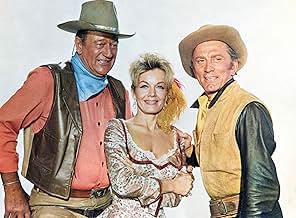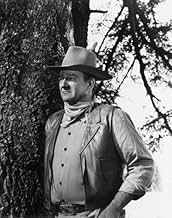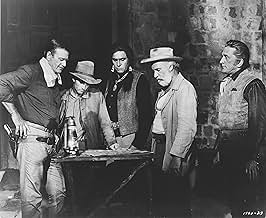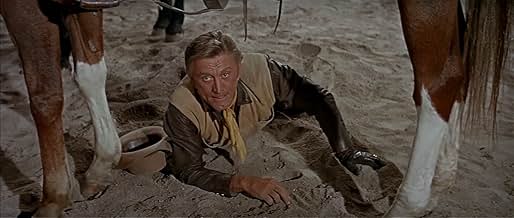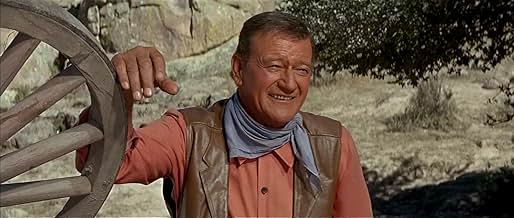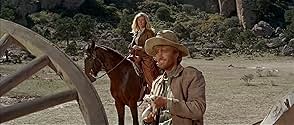IMDb-BEWERTUNG
6,8/10
11.555
IHRE BEWERTUNG
Die Geschichte eines Mannes, der erschossen, ausgeraubt und inhaftiert wurde, der zurückkehrt, um eine große Goldladung von dem Mann zu stehlen, der ihm Unrecht getan hat. Das Gold wird in e... Alles lesenDie Geschichte eines Mannes, der erschossen, ausgeraubt und inhaftiert wurde, der zurückkehrt, um eine große Goldladung von dem Mann zu stehlen, der ihm Unrecht getan hat. Das Gold wird in einer gepanzerten Postkutsche, dem Kriegswagen, transportiert.Die Geschichte eines Mannes, der erschossen, ausgeraubt und inhaftiert wurde, der zurückkehrt, um eine große Goldladung von dem Mann zu stehlen, der ihm Unrecht getan hat. Das Gold wird in einer gepanzerten Postkutsche, dem Kriegswagen, transportiert.
- Auszeichnungen
- 1 wins total
Robert Walker Jr.
- Billy Hyatt
- (as Robert Walker)
Emilio Fernández
- Calita
- (as Emilio Fernandez)
Boyd 'Red' Morgan
- Early
- (as Red Morgan)
Empfohlene Bewertungen
'The War Wagon' will never be considered one of John Wayne's great Westerns like 'Rio Bravo', 'The Searchers', or 'Red River', but it is a an enjoyable Western with fine performances and great rapport between Kirk Douglas and John Wayne. The action sequences are well done, the humor dry as the desert it takes place in, and the caper story line rather refreshing for a John Wayne film.
The problem? When the picture ends it leaves you feeling empty. The characters are not particularly interesting (save for Douglas) and the villain is your standard cattle baron murderous jerk. The war wagon itself is an interesting prop and well used, but never really becomes the menacing character it should've been. I enjoyed the movie as a fan of John Wayne and Westerns in general, yet I doubt most of his fans will find this film particularly impressive when compared to many of his other Westerns directed by Hawks and Ford. That isn't to say you should avoid seeing 'The War Wagon', but you should temper your expectations for what is really just an empty Saturday-afternoon adventure. You'll like it while you're watching it and then forget it as soon as the credits roll.
The problem? When the picture ends it leaves you feeling empty. The characters are not particularly interesting (save for Douglas) and the villain is your standard cattle baron murderous jerk. The war wagon itself is an interesting prop and well used, but never really becomes the menacing character it should've been. I enjoyed the movie as a fan of John Wayne and Westerns in general, yet I doubt most of his fans will find this film particularly impressive when compared to many of his other Westerns directed by Hawks and Ford. That isn't to say you should avoid seeing 'The War Wagon', but you should temper your expectations for what is really just an empty Saturday-afternoon adventure. You'll like it while you're watching it and then forget it as soon as the credits roll.
Take the idea of gold shipment transported by an impenetrable vehicle, armored, armed and escorted by a team of armed guards. Your goal, rob it.
Sounds like another bank job/caper flick starring Nick Cage or taking place in Vegas? Sure! But, make it an old time western, then cast John Wayne, Kirk Douglas, Bruce Cabot, Bruce Dern, Keenan Wynn and Howard Keel as a Jewish Indian and you have the makings of a classic.
The War Wagon, complete with catchy title tune, is another notch in the Duke's gun for being dead on target for what his fans crave: A solid, stoic hero, framed, robbed of all his possessions and jailed by an evil banker (Cabot), he is released and vows revenge by stealing his regular gold dust shipment. The problem is that the gold is transported in the title vehicle, an armored stagecoach with gattling gun mounted on top; an unstoppable juggernaut escorted by two teams of riflemen and riders. Throw in Kirk Douglas as an old friend who's been hired to kill him, a drunken, shaky nitro expert, played by the ever pre-pubescent looking Robert Walker Jr., a half Jewish/Half-Indian compadre (Howard Keel), a bitter, miserly thief (Keenan Wynn), his young, enslaved wife (a luminescent Joanna Barnes, also a "Spartacus" alumni)), toss in typical Western scum like Bruce Dern, and you have a high adventure caper flick that will keep you entertained for the length of the picture.
The on-screen magic of Wayne and Douglas is never in better form than here, with all the usual hijinks the stars can pack into this epitome of the Saturday Matinee Action movie before they became techo-terrors of dueling visual effects.
Sounds like another bank job/caper flick starring Nick Cage or taking place in Vegas? Sure! But, make it an old time western, then cast John Wayne, Kirk Douglas, Bruce Cabot, Bruce Dern, Keenan Wynn and Howard Keel as a Jewish Indian and you have the makings of a classic.
The War Wagon, complete with catchy title tune, is another notch in the Duke's gun for being dead on target for what his fans crave: A solid, stoic hero, framed, robbed of all his possessions and jailed by an evil banker (Cabot), he is released and vows revenge by stealing his regular gold dust shipment. The problem is that the gold is transported in the title vehicle, an armored stagecoach with gattling gun mounted on top; an unstoppable juggernaut escorted by two teams of riflemen and riders. Throw in Kirk Douglas as an old friend who's been hired to kill him, a drunken, shaky nitro expert, played by the ever pre-pubescent looking Robert Walker Jr., a half Jewish/Half-Indian compadre (Howard Keel), a bitter, miserly thief (Keenan Wynn), his young, enslaved wife (a luminescent Joanna Barnes, also a "Spartacus" alumni)), toss in typical Western scum like Bruce Dern, and you have a high adventure caper flick that will keep you entertained for the length of the picture.
The on-screen magic of Wayne and Douglas is never in better form than here, with all the usual hijinks the stars can pack into this epitome of the Saturday Matinee Action movie before they became techo-terrors of dueling visual effects.
I generally don't like caper films. Usually, when they end, I'm still waiting for a beginning. This one is much better than usual, largely due to the action packed finale, bawdy humor and a flamboyant performance by Kirk Douglas. Wayne, as Taw Jackson, has an unusual role. Possibly for the first time since TROUBLE ALONG THE WAY, he plays a loser. He's lost his ranch, been shot and falsely imprisoned for three years by Bruce Cabot. How this has happened is never made clear; and one wonders why Wayne seems universally disliked by his former neighbors. Considering his former wealth, one would imagine at least one of his ex-ranch hands would treat him well. Just WHERE are his ranch hands. This is never made clear, and it weakens the believability of the story.
However, the caper is the thing and, whoah, it's a doozie. Getting there is a lot of fun and worth seeing. It's also interesting the cynicism presented her. In one scene, a stablekeeper dismisses Wayne with contempt, while Douglas, a hired killer, is treated with the greatest of respect(!) By 1967, Wayne had come a long way from his denunciation of HIGH NOON for it's unsympathetic, cowardly townspeople.
While not a must see, THE WAR WAGON is very entertaining. I give it a "7".
However, the caper is the thing and, whoah, it's a doozie. Getting there is a lot of fun and worth seeing. It's also interesting the cynicism presented her. In one scene, a stablekeeper dismisses Wayne with contempt, while Douglas, a hired killer, is treated with the greatest of respect(!) By 1967, Wayne had come a long way from his denunciation of HIGH NOON for it's unsympathetic, cowardly townspeople.
While not a must see, THE WAR WAGON is very entertaining. I give it a "7".
Framed ex-con/rancher Taw Jackson (John Wayne) is out for revenge. He plans to steal the title vehicle and $500,000 in gold, which belongs to Frank Pierce (Bruce Cabot), the man who framed him and stole his land. To help him carry out his plan, Jackson recruits gunfighter Lomax (Kirk Douglas); Levi Walking Bear (Keel); explosives expert Billy Hyatt (Robert Walker Jr.); and inside man Wes Catlin (Keenan Wynn). Nothing goes exactly as planned, and there are enough twists and turns along the way to keep the film from being a bore.
Keel walks off with the acting honors with his parody of the Indian sidekick of the hero. Wynn yells like he's being paid by the decibel. Walker Jr. is sincere and occasionally funny. Douglas and Wayne's scenes together play like duels to see who can steal the scene.
This film boasts one of Dimitri Tiomkin's last scores. William Clothier (photographer of 1960's "The Alamo" and 1964's "Cheyenne Autumn") did the very good cinematography. This is not one of either Wayne's or Douglas' best, but it is good enough to warrant a watch. Made by Universal, this is one of the few pre 1970 (heck, pre 2000 for that matter) films of any genre that AMC (Always More Commercials) still plays.
Keel walks off with the acting honors with his parody of the Indian sidekick of the hero. Wynn yells like he's being paid by the decibel. Walker Jr. is sincere and occasionally funny. Douglas and Wayne's scenes together play like duels to see who can steal the scene.
This film boasts one of Dimitri Tiomkin's last scores. William Clothier (photographer of 1960's "The Alamo" and 1964's "Cheyenne Autumn") did the very good cinematography. This is not one of either Wayne's or Douglas' best, but it is good enough to warrant a watch. Made by Universal, this is one of the few pre 1970 (heck, pre 2000 for that matter) films of any genre that AMC (Always More Commercials) still plays.
I didn't like the "War Wagon" when it was first released, I found it rather silly and vaguely offensive. The problem was me, I was not ready to recognize, let alone relate to, a subtle parody of the western genre. I should have been more receptive because in the mid-60s a huge amount of genre parody began to appear on television ("Batman", 'Wild Wild West", "F- Troop", "Get Smart"), which could be traced back to gently tongue-in-cheek series like "Maverick" and "Zorro".
"Cat Ballou" (1965) was the first feature length parody of Western genre clichés. But its parody elements were obvious, even if you were not that familiar with the conventions of the Western genre you could recognize exaggerations and revisions. In addition, up to this point John Wayne films had given the Western genre only very traditional treatments.
But "The War Wagon" was only the first example of director Burt Kennedy's tweaking of the genre. He would follow it up with "Support Your Local Sheriff" (1969), "Hannie Caulder" (1971), and "Support Your Local Gunfighter" (1971). Wayne would toy with parodic elements two years later with "True Grit", and would stay much less traditional with the remainder of his westerns.
"The War Wagon" is also a genre hybrid as western is mixed with buddy picture and big heist movie. Taw (John Wayne) recruits an old enemy Lomax (Kirk Douglas) as he seeks revenge on a ruthless mine owner (Bruce Cabot) who not only framed and sent to him prison, but appropriated his ranch and personal possessions after a huge gold strike was discovered on ranch property (here we go with the exaggeration-the only things missing are stealing Taw's wife, adopting his children, and leaving his toilet seat up). Cabot transports his gold in a "Wild Wild West" inspired armored wagon.
The interplay between Wayne and Douglas (who always seems right on the verge of accepting Cabot's standing offer of $12,000 to kill Wayne) is clever and sarcastic, working with the many exaggerated elements to provide the film's considerable humor.
"The War Wagon" finds Wayne on the wrong side of established authority, for at least the third time as his Ethan Edwards character in "The Searchers" also operated well outside the law and Quirt Evans in "Angel and the Badman" had to be bad enough that he could be reformed by Gail Russell.
Howard Keel plays the civilized Indian sidekick mostly for comic relief and the characters actually demonstrate an awareness of the movie context when they self-reflexively (deliberately drawing attention to their playing characters in a movie) refer to a tactic as an old Indian trick. Ultimately the joke (and the irony) is on Wayne and Douglas, as their seemingly one-sided deal with the Indians (a few blankets in exchange for their participation) causes the Indians to end up with most the rewards.
"The War Wagon's" understated parody style would inspire John Huston ("The Life & Times Of Judge Roy Bean") and George Roy Hill ("The Sting"); and of course many others.
Then again, what do I know? I'm only a child.
"Cat Ballou" (1965) was the first feature length parody of Western genre clichés. But its parody elements were obvious, even if you were not that familiar with the conventions of the Western genre you could recognize exaggerations and revisions. In addition, up to this point John Wayne films had given the Western genre only very traditional treatments.
But "The War Wagon" was only the first example of director Burt Kennedy's tweaking of the genre. He would follow it up with "Support Your Local Sheriff" (1969), "Hannie Caulder" (1971), and "Support Your Local Gunfighter" (1971). Wayne would toy with parodic elements two years later with "True Grit", and would stay much less traditional with the remainder of his westerns.
"The War Wagon" is also a genre hybrid as western is mixed with buddy picture and big heist movie. Taw (John Wayne) recruits an old enemy Lomax (Kirk Douglas) as he seeks revenge on a ruthless mine owner (Bruce Cabot) who not only framed and sent to him prison, but appropriated his ranch and personal possessions after a huge gold strike was discovered on ranch property (here we go with the exaggeration-the only things missing are stealing Taw's wife, adopting his children, and leaving his toilet seat up). Cabot transports his gold in a "Wild Wild West" inspired armored wagon.
The interplay between Wayne and Douglas (who always seems right on the verge of accepting Cabot's standing offer of $12,000 to kill Wayne) is clever and sarcastic, working with the many exaggerated elements to provide the film's considerable humor.
"The War Wagon" finds Wayne on the wrong side of established authority, for at least the third time as his Ethan Edwards character in "The Searchers" also operated well outside the law and Quirt Evans in "Angel and the Badman" had to be bad enough that he could be reformed by Gail Russell.
Howard Keel plays the civilized Indian sidekick mostly for comic relief and the characters actually demonstrate an awareness of the movie context when they self-reflexively (deliberately drawing attention to their playing characters in a movie) refer to a tactic as an old Indian trick. Ultimately the joke (and the irony) is on Wayne and Douglas, as their seemingly one-sided deal with the Indians (a few blankets in exchange for their participation) causes the Indians to end up with most the rewards.
"The War Wagon's" understated parody style would inspire John Huston ("The Life & Times Of Judge Roy Bean") and George Roy Hill ("The Sting"); and of course many others.
Then again, what do I know? I'm only a child.
Wusstest du schon
- WissenswertesDuring the production, Kirk Douglas was late to the set because he was shooting a commercial endorsement for the Democratic Governor of California, Edmund G. Brown. John Wayne was furious, and was late to work the next day because he was shooting a commercial for the Republican candidate Ronald Reagan.
- PatzerWhen the gold wagon crashes it stops with it's right side wheels up. When Taw gets to it, it has it's left side wheels in the air.
- VerbindungenFeatured in Dick Cavett Show: Kirk Douglas (1971)
Top-Auswahl
Melde dich zum Bewerten an und greife auf die Watchlist für personalisierte Empfehlungen zu.
- How long is The War Wagon?Powered by Alexa
Details
Box Office
- Bruttoertrag in den USA und Kanada
- 11.990.000 $
- Laufzeit1 Stunde 41 Minuten
- Seitenverhältnis
- 2.35 : 1
Zu dieser Seite beitragen
Bearbeitung vorschlagen oder fehlenden Inhalt hinzufügen




